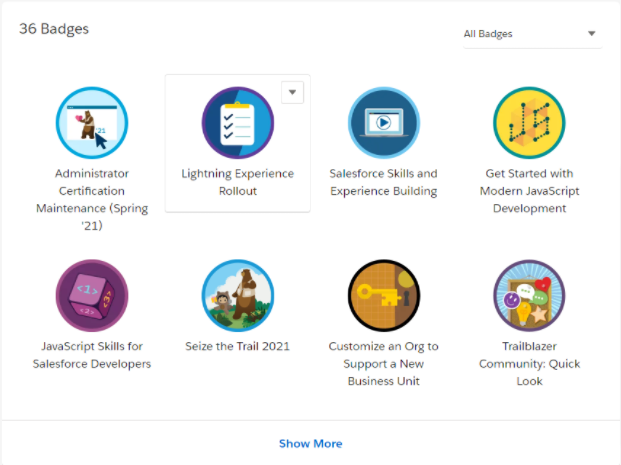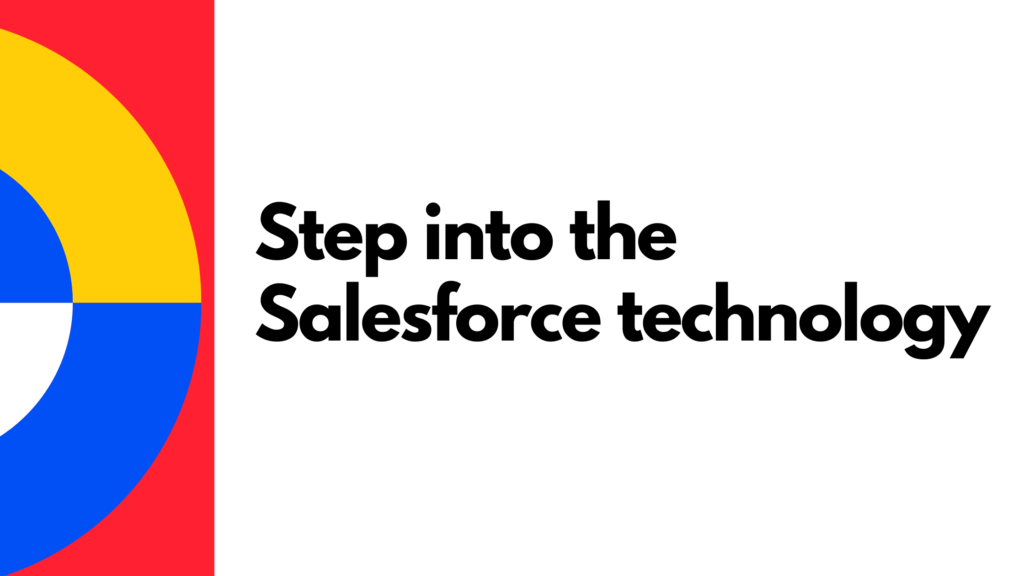Cloud-Based Software, Customer Relationship Management (CRM)
Salesforce Quick Intro
Salesforce is a cloud computing service as a software (SaaS) company that specializes in customer relationship management (CRM). Companies that use Salesforce to understand their customers, connect with them on a variety of levels and help grow their customer base.
Where to start?
Salesforce has a 100% free self-learning Portal maintained by Trailhead. Salesforce trailhead is completely designed to get knowledge on salesforce inbuilt tools, development methods, platform builder ideas, much more. This Portal has a wide range of documentation which includes theoretical explanations and practical exercises. Trailhead has some interesting ways to get addicted by collecting Badges and Superbadges for each module completed successfully.  Modules have a brief explanation and real-time exercises to complete to earn badges. Follow instructions in modules and complete the task on Trailhead playground then verify the steps to complete the module and earn points along with the badge. Every badge has the skillset to learn/improve. Based on the earned badges can able to see skills improvement and participation in every different service in salesforce. Rollup to a Salesforce Role We have a handful of options in roles to learn things like Administrator, Developer, Consultant, Architect, Marketer. All these options required a basic understanding of the Salesforce platform. Salesforce Administrator: A Salesforce Administrator is the person that provides value to the business by automating complex business processes, makes sure the system is clean and efficient and monitors new releases (these occur three times a year). Essentially, your Salesforce Admin is the SME Salesforce expert within the organization, and they will have an in-depth understanding of customization. Salesforce Developer: A Salesforce Developer is the API integration and code expert. Traditionally, Salesforce Developers create complex workflows, triggers, APEX development, complex validation rules, AppExchange, and legacy platform integrations. Salesforce Consultant: This particular role is more often than not found working with Salesforce partners rather than an End User, although they may be engaged by an End-user for a specific project. This role is similar to the Salesforce Business Analyst role but often requires more hands-on configuration and a deeper understanding of the Salesforce platform. Salesforce Functional Consultants often come from a Salesforce Administrator background or may have transitioned from another technology. Salesforce Architect: The Salesforce Architect is a key member of the Salesforce implementation project team and is responsible for the overall technical design and build of the custom elements of a project. The Technical Architect works as a team member along with Solution Architect and supporting team members to deliver the complete solution for the customer. A Salesforce Architect is essentially responsible for designing a solution for a specific problem utilizing available Salesforce products and technologies, of which there are multiple within the Salesforce product suite. Salesforce Marketer: A salesforce marketer creates targeted marketing campaigns to connect with customers and deliver effective, personalized customer journeys. In other words, marketers want to know everything they can about their customers to deliver the right message at the right time. While it’s simple to summarize what marketers strive to do, there’s a multitude of skills, knowledge, data, and activities that are fundamental to success. This is a basic introduction to salesforce technology for those who step into it and start a career on the Salesforce platform.
Modules have a brief explanation and real-time exercises to complete to earn badges. Follow instructions in modules and complete the task on Trailhead playground then verify the steps to complete the module and earn points along with the badge. Every badge has the skillset to learn/improve. Based on the earned badges can able to see skills improvement and participation in every different service in salesforce. Rollup to a Salesforce Role We have a handful of options in roles to learn things like Administrator, Developer, Consultant, Architect, Marketer. All these options required a basic understanding of the Salesforce platform. Salesforce Administrator: A Salesforce Administrator is the person that provides value to the business by automating complex business processes, makes sure the system is clean and efficient and monitors new releases (these occur three times a year). Essentially, your Salesforce Admin is the SME Salesforce expert within the organization, and they will have an in-depth understanding of customization. Salesforce Developer: A Salesforce Developer is the API integration and code expert. Traditionally, Salesforce Developers create complex workflows, triggers, APEX development, complex validation rules, AppExchange, and legacy platform integrations. Salesforce Consultant: This particular role is more often than not found working with Salesforce partners rather than an End User, although they may be engaged by an End-user for a specific project. This role is similar to the Salesforce Business Analyst role but often requires more hands-on configuration and a deeper understanding of the Salesforce platform. Salesforce Functional Consultants often come from a Salesforce Administrator background or may have transitioned from another technology. Salesforce Architect: The Salesforce Architect is a key member of the Salesforce implementation project team and is responsible for the overall technical design and build of the custom elements of a project. The Technical Architect works as a team member along with Solution Architect and supporting team members to deliver the complete solution for the customer. A Salesforce Architect is essentially responsible for designing a solution for a specific problem utilizing available Salesforce products and technologies, of which there are multiple within the Salesforce product suite. Salesforce Marketer: A salesforce marketer creates targeted marketing campaigns to connect with customers and deliver effective, personalized customer journeys. In other words, marketers want to know everything they can about their customers to deliver the right message at the right time. While it’s simple to summarize what marketers strive to do, there’s a multitude of skills, knowledge, data, and activities that are fundamental to success. This is a basic introduction to salesforce technology for those who step into it and start a career on the Salesforce platform.

